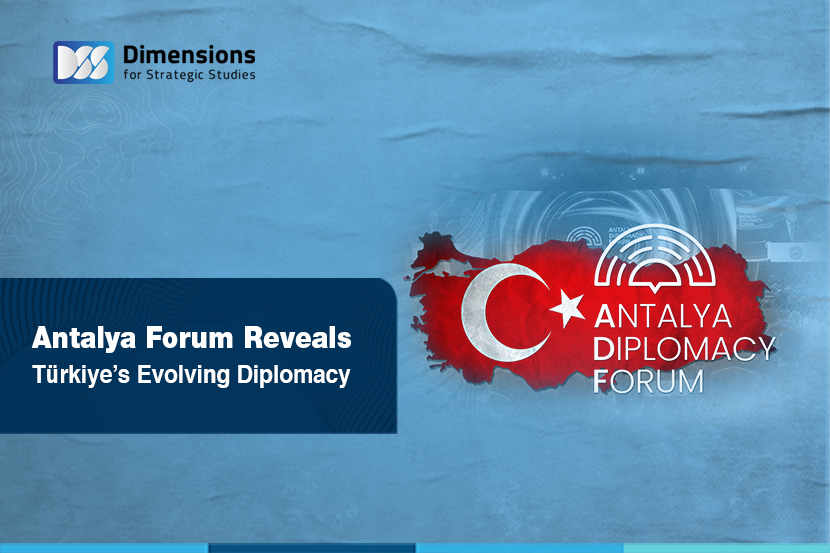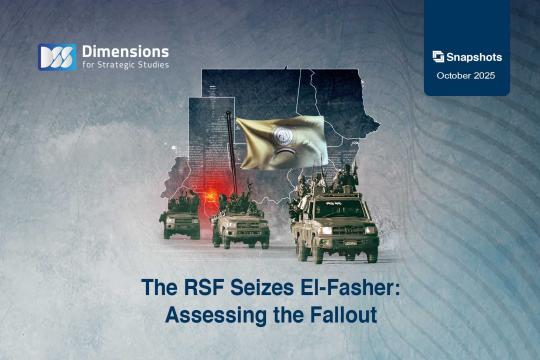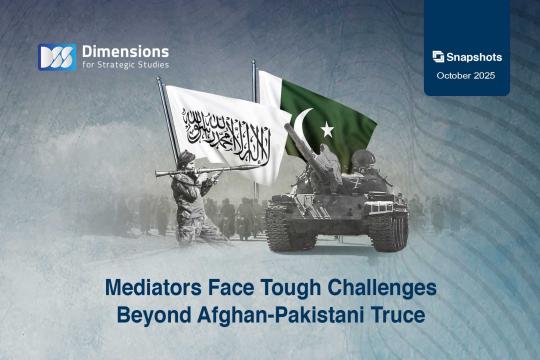
Antalya Forum Reveals Türkiye’s Evolving Diplomacy
2024-03-235100 view
Introduction
The Antalya Diplomacy Forum is a major platform for Türkiye’s efforts to strengthen its diplomatic influence. It plays an important role in strengthening Turkish diplomatic capabilities, and has come to constitute a basic pillar in Ankara’s “conference diplomacy” at the national level, with domestic implications for Türkiye too. A close analysis of the participants and the topics discussed also reveals much about the dominant trends and themes in Turkish foreign policy.
The Forum, whose third (2024) edition was held at the Nest Convention Center near Antalya from March 1-3, gathered leaders and policy makers from across the world to provide a space for discussions to address global challenges and enhance mutual understanding. The forum also promotes Türkiye’s growing role in regional and global affairs, and its ability to build relationships between different countries around the world.
Türkiye has shown itself to be well suited to playing a greater role in promoting constructive engagement and international cooperation. The Antalya Diplomacy Forum represents a manifestation of this trend and Türkiye’s endeavors to play a greater role internationally.
Section 1: The Creation and Development of the Antalya Diplomacy Forum
A) Why Antalya?
Antalya was chosen as the host city for the first, 2021 edition of the Forum for several reasons. It enjoys a strategic location on the Mediterranean coast, a bridge linking Europe, Asia and Africa, and provides easy access for participants. Antalya’s rich and diverse historical heritage makes it a poignant location for an international diplomatic conference, and its advanced infrastructure is well-suited to accommodating large international events smoothly and professionally. The fact that Mevlüt Çavuşoğlu, who was Turkish foreign minister at the time, hails from nearby Alanya confirms the importance of Antalya province within Turkish diplomatic circles.
Antalya’s reputation as a popular tourist destination also contributes to the government’s broader goals of strengthening its international relations. This facet has helped the government organize various global forums such as a recent symposium on nurturing economic development and improving international relations. This chimes with the Forum’s strategic objectives of promoting diplomacy, economic development and political harmony among participating countries.
B) Forums as a Diplomatic Tool
Diplomatic forums can play a significant role as platforms for discussing contemporary international issues and promoting dialogue between countries. Prominent examples include the World Economic Forum in Davos, the Munich Security Conference and the World Public Forum - Dialogue of Civilizations. Such events attract political heavyweights and business leaders. The Antalya Forum aims to attract a more diverse range of attendees including students, academics, senior civil servants and ministers, along with senior government figures up to and including heads of state and government.
Such diversity fosters wide-ranging discussions at the forum and encourages the exchange of ideas from diverse perspectives. The participation of academics and students from across Türkiye also adds academic depth to the forum, enriching discussions and nurturing a sense of responsibility among the youth as concerns Türkiye’s future. In addition, the forum focuses on dialogue between various sectors of society and efforts to address global challenges comprehensively, by bringing together individuals and groups from academia, government and civil society.
The Antalya Forum also allows participants to voice criticism and propose tangible solutions, as it provides a platform for voices from the Global South, allowing them to challenge Western hegemony and express alternative viewpoints.
C) First and Second Editions
The first and second Antalya forums attracted a large number of participants from diverse regions of the world. They provided a useful platform for constructive dialogue and cooperation on urgent global issues. Over 1,000 delegates attend the first edition in June 2021, with 17 sessions on the theme of “Innovative Diplomacy: New Era, New Approaches”. Based on this success, the second conference was organised in March 2022 under the title “Recoding Diplomacy” and attracted even more people - 3,260 registered participants from 75 countries, including 17 heads of state and government, 80 ministers, diplomats, business executives, journalists, and academics.
The third edition took place in March 2024 under the title “Advancing Diplomacy in Times of Turmoil”. This time, it included 52 sessions and attracted even more participants, from 147 countries. Each year, the Forum expands its scope, improves its content and attracts more participants, reflecting a commitment to continuous improvement.
Throughout its history so far, the Forum has addressed a wide range of issues, from regional conflicts such as those in Syria and Yemen, to global economic challenges in the wake of the financial crisis. Climate change has emerged as a core element of the Forum’s agenda, highlighting the need for collective action to mitigate its impacts and promote sustainability and environmental protection. The forum has also hosted discussions on strengthening international cooperation on counter-terrorism while supporting human rights and civil liberties.
Section 2: The Antalya Diplomacy Forum and Türkiye’s Foreign Policy
The principal value of the gathering from an analytical perspective is that it provides an insight into current trends in Türkiye’s foreign policy. Indeed, Türkiye uses the Antalya Diplomacy Forum as a tool to communicate its foreign policy agenda to the world. The 2024 edition revealed several Turkish priorities and dynamics, as follows.
A) The Return of “Zero Problems with the Neighbors”
Türkiye’s policy of “zero problems with the neighbors” historically aimed to improve and strengthen its relations with its regional and global counterparts. However, this policy was compromised in the complex fallout of the Arab Spring uprisings, which forced Türkiye to reevaluate its position.
Since 2021 however, Ankara has sought to realign its foreign policy course by reviving the concept, with a focus on avoiding conflict and prioritizing cooperation and development. The Antalya forum is a useful tool in this regard, allowing the Turkish government to communicate with various actors and express its diplomatic goals within this framework.
A central element in Türkiye’s new foreign policy approach is a focus on normalization of relations. Ankara is seeking to repair ties with neighboring countries and establish new partnerships at the global level. Through the Antalya gathering, Türkiye is able to engage in both direct and indirect diplomatic dialogue, strength mutual understanding and explore means of cooperation.
B) Tackling Regional Crises
Recent regional crises - including Türkiye’s economic downturn, the coronavirus pandemic and Russia’s invasion of Ukraine - have significantly impacted Türkiye’s foreign policy. These challenges have negatively impacted Türkiye’s regional influence, necessitating a re-evaluation of its strategies and diplomatic relations.
In this context, the Antalya Diplomacy Forum has emerged as an important initiative for addressing Türkiye’s crises. By providing a platform for diplomatic engagement and dialogue, the gathering provides Ankara with an opportunity to strengthen its diplomatic relations with other countries, and to enhance its influence and status globally.
Section 3: International Participation
A) Regional and International Presence
The third Antalya Diplomacy Forum demonstrated the growing reach of Türkiye’s foreign policy, attracting more than 5,000 participants from 147 countries. Prominent figures, including 19 heads of state and 73 ministers, took part in diplomatic meetings during the event. Prominent participants included Russian Foreign Minister Sergei Lavrov; Ersin Tatar, the president of the breakaway Turkish-backed republic of Northern Cyprus; South Africa’s Minister of International Relations Naledi Pandor; Prime Minister Viktor Orban of Hungary; and Sameh Shoukry, Egypt’s Foreign Minister.
That said, Western representation in the Forum was noticeably lacking compared with other regions. While a strong cohort came from the Balkan countries, heads of state and ministers from major Western powers such as the United States, Britain, France, and Germany were noticeably absent. This could be for several reasons, but one appears to be the continued opposition of Western countries to the foreign policy of Türkiye, which is striving to carve out a position relatively independent from that of the Western camp.
B) African Presence
The conference attracted a large African presence. This reflects the continent’s increasing importance in Turkish foreign policy. Ankara is making strenuous efforts to strengthen its relations with African countries and expand its influence on the continent, investing in long-term ties and strengthening both defense and trade relations with African states.
Indeed, Turkish relations with African countries have witnessed a qualitative leap since the Justice and Development Party (AKP) took power. In 2002, Türkiye only had official diplomatic relations with seven countries in Africa. Thanks to the AKP’s policy of diplomatic outreach, this number has rapidly increased, and today it has relations with 49 out of the 54 countries on the continent recognized by the United Nations. Türkiye has embassies in 45 of these states, and has exchanged consulates with the remaining four.
This engagement has yielded results at various levels. The volume of Turkish-African trade has increased dramatically from only $5.4 billion in 2003 to more than $40.7 billion by the end of 2022. Over the same period, Turkish companies have implemented huge projects in Africa, with a total value exceeding $82 billion, while direct Turkish investments in the continent have topped $10 billion.
Turkish-African collaboration is also very diverse, spanning vital industries such as agriculture, energy, mining, light and medium industrial, transportation, and communications. Turkey is also promoting cooperation with African countries in areas such as education, health, the environment, culture, and tourism.
C) Arab Presence
There was a significant Arab presence at the forum, reflecting Türkiye’s return to its previous approach of engagement with Arab countries, which Ankara sees as its geographical depth as well as a vital important economic market.
Türkiye began a trend of opening up to Arab countries around 15 years ago, scrapping entry visas for most of them, which sparked an influx of Arab tourists. Ankara also boosted its trade ties with Arab countries, and its humanitarian and cultural presence in many of them.
However, this engagement rapidly declined due to the wave of instability across the region, which dragged Türkiye into regional rivalries and led to the deterioration of its political and economic relations with various countries across the region.
However, the significant Arab presence at the Antalya conference indicates that Türkiye is shifting back towards its “zero problems” policy and working to resolve its main problems with Arab countries.
Section 4: Major Themes of Discussion
The Antalya Diplomacy Forum serves as a crucial platform for Türkiye to enhance its foreign relations and foster open channels of dialogue. President Erdoğan had discussions with 11 heads of state on the sidelines of the gathering, while Foreign Minister Hakan Fidan held meetings with 32 of his counterparts from around the world.
The forum facilitated conversations on a wide range of urgent international topics, including conflict in the region. The forum also addressed important economic concerns, including the fallout from the global financial crisis and the need to combat climate change. These conversations emphasized the importance of working together and making concerted attempts to overcome these challenges.
Among the most prominent issues addressed at the forum:
1) The War in Gaza
The ongoing war in Gaza was a central topic at the 2024 forum. President Erdoğan and Foreign Minister Fidan spoke frankly about Israel’s genocidal campaign there during the forum’s opening session. Erdoğan said recognition of the Palestinian state was the only way to repay the international community’s moral debt to Palestine.
Foreign Minister Fidan also focused his speech on Gaza, linking the Gaza war to the crisis of the international system. “The unfolding events in Gaza is the most evident sign of the legitimacy crisis of the international system,” he said. “The snapshot of Gaza today displays a catastrophic moment where the hypocrisy of the international system cannot be concealed.”
He added that Türkiye would continue to strive to bring about a change in the nature of the international system.
The forum was a space for many informal sessions and discussions on the conflict in Gaza, particualrly focusing on Turkish mediation and ceasefire proposals. That said, more analysis could be conducted on how the forum could facilitate mediation efforts to end the conflict. The forum attempted to provide a constructive platform for dialogue between Palestinian factions Hamas and Fatah, as the Turkish government attempts to mediate between them.
2) The War in Ukraine
The war in Ukraine was another major topic at the Antalya forum, including at official meetings held on its sidelines. Notably, Russian Foreign Minister Sergei Lavrov discussed the war with his Turkish counterpart Fidan.
The war was also a major focus of President Erdoğan’s keynote speech and of most of the other speeches and sessions, especially those related to food security.
3) The Syrian Crisis
The forum included a special session to discuss the Syrian crisis, attended by the UN’s Special Envoy to Syria, Geir Pedersen, the Regional Humanitarian Coordinator for the Syria Crisis, Muhannad Hadi, and the chairman of the opposition Syrian Negotiating Committee, Dr Bader Jamous. Russia and Iran were notably absent.
The fact a session was scheduled to discuss the situation in Syria reflected its importance on the Turkish foreign policy agenda, and the subject is likely to be high on that agenda after Turkish municipal elections at the end of March.
4) Global Food Security
Food security became a pressing issue globally in the wake of the coronavirus pandemic, and this dynamic became more acute after the Russian invasion of Ukraine, which disrupted supply chains around the world.
The forum held a special session on food security, where several senior international officials discussed the global food security crisis, its causes and possible mechanisms for tackling it.
Section 5: Looking to the Future
A number of predictions can be made regarding the future of the Antalya Diplomacy Forum and its role in shaping Turkish diplomacy. Türkiye is likely to continue holding the forum on a regular basis, and to leverage it to enhance its position and influence in global affairs. The forum serves as an important platform for Türkiye to engage with international stakeholders, address pressing global issues, and present its diplomatic initiatives to a diverse audience.
Moreover, it is possible that more international actors will take part in the forum in the coming years, especially if relations between Türkiye and the West improve. If Western countries can take part in the Forum, international actors may show more interest. More engagement would enrich the discussions, broaden the perspectives and foster greater cooperation on global challenges.
Türkiye is however likely to maintain its focus on prioritizing engagement with Africa. The forum provides a means for Türkiye to deepen its economic cooperation and explore new avenues for partnership and development on the continent. By investing in Africa’s stability and prosperity, Türkiye aims to expand its influence there while contributing to regional development.
Conclusion
The Antalya Diplomacy Forum has quickly become a major event in the Turkish diplomatic calendar, and is gaining prominence both domestically and internationally. Through its various sessions and informal debates, the conference plays an important role in strengthening Turkish diplomacy.
Foreign Minister Fidan’s focus on the importance of countries within the region managing the region’s affairs embodies the spirit of the forum. It highlights the possibility of emerging regional powers becoming central actors in resolving regional crises, in contrast with the dictates of traditional great powers.
Moreover, the institutional formula of the forum, its continuity and government backing give it an advantage, enabling it to transcend individuals and political affiliations to become a pillar of Türkiye’s diplomatic endeavors as a state. That said, potential shifts in Türkiye’s power dynamics could shift the emphasis and identity of the forum.
The selection of the highly diverse touristic province of Antalya as the forum’s venue reflects a desire to promote diverse viewpoints. Participants from both developed and developing countries have contributed to enriching the discussions and promoting innovative solutions to the issues being considered.
Informal engagement and back-door diplomacy are also a major part of the value of the forum, adding to the formal discussion panels. President Erdoğan’s call for a multipolar world order and emphasis on the importance of diplomacy in overcoming the challenges of the 21st century resonated deeply in the forum’s discourse. This could gain currency as a result of the crises the international system is currently struggling to resolve, most notably the catatrophe in Gaza.
As the West’s pull as a global power center declines, Global South players grow in influence and the polarization between Russia and China on the one hand and the West on the other deepens, Türkiye is emerging as a rising diplomatic power. The Antalya Diplomacy Forum is one of the tools as its disposal to achieve stability in the areas surrounding it, from Syria to Ukraine, Somlia to Karabakh, and the Eastern Mediterranean in general.
Read more on the folowing link: (Click here)





